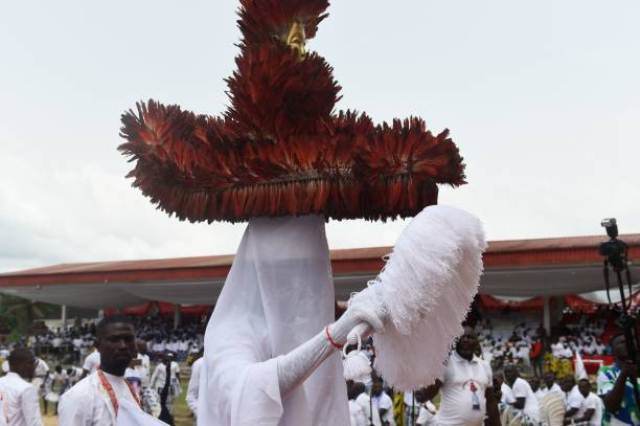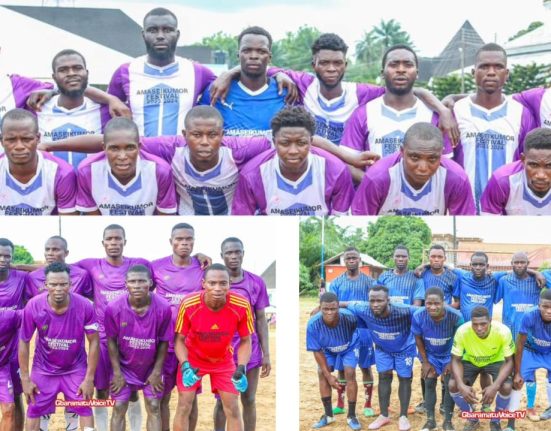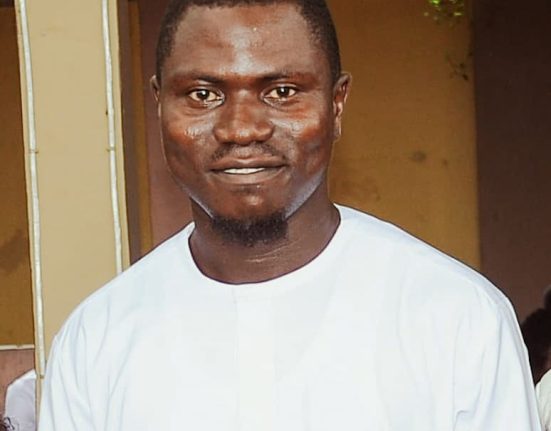Amaseikumor Festival: Where water spirit displays as masquerade
Amaseikumor is one of the Ijaw traditions that has endured the test of time. Its celebration is marked annually by the Ijaw people in Gbaramatu kingdom of Warri South West Local Government Area, Delta State.
Amaseikumor means good living, peace, unity, prosperity and protection to the communities in Gbaramatu kingdom. Those who know better in Gbaramatu would say that Amaseikumor is one festival that has existed since 14AD. It was Pa. Obuko of Azama town that first held the Chief Priest position and performed the ethics of Amaseikumor in tandem with its traditional rituals.
Previous years, Amaseikumor was celebrated in the month of March unlike it’s this year. Whenever it is celebrated, Oporoza town, the Headquarters of Gbaramatu kingdom would be a beehive of people from far and near and the ancient Kingdom serves as host to towns and villages under her.
Like many festivals in the Ijaw nation, for instance the Owu-Aru-Sun of the Buguma area in Rivers State celebrated every 20 years, Amaseikumor is an ancient deity that originated from river, and has since his emergence been celebrated by the towns and villages under Gbaramatu Kingdom.
This festival is not a kitchen type; there are rules guiding it. However, this year’s celebration was reduced to five days taking into cognizance the security situation in the area and other sundry issues, as against the normal seven days it is observed. The festival is not a tea party; the people of the Kingdom dot their traditional regalia as insignia heralding the great Amaseikumor which has brought envy to other nations that have relegated their traditions for the lucre of westernization.
During the period of this festival, it is binding on all the communities in Gbaramatu kingdom to attend and take active part in the celebrations. This is because Amaseikumor festival itself is a combination of several masquerades from different communities in the kingdom; each of the communities is given opportunity to display skills of her masquerades.
Amaseikumor festival can be regarded as the most important and highly celebrated festivals in Gbaramatu kingdom in the ancient days and till now. Records from past celebrations and its significance no doubt make an average Gbaramatu person to hold the celebration in high esteem.
Amaseikumor festival according to investigation heralds unprecedented peace to Gbaramatu kingdom and her people. This has therefore established Amaseikumor as a deity of peace. More so, the people of the kingdom are more united, and enjoy abundant blessings after the celebration. These blessings flow in diverse ways. For instance, there are usually abundant produce from fishermen, hunters, farmers, traders, etc. The people in addition, also enjoy good health, safe delivery of pregnant women and good neighbourliness.
Also, Amaseikumor festival, according to research is key to protection of the people of Gbaramatu kingdom. It was gathered that after the celebration, people are protected from premature death, accidents, ill-health and strange diseases, etc.
It is a standpoint and a symbol of unity that offer the entire people of Gbaramatu the opportunity to gather and unite as one during and after the festival. This is so as the communities in the kingdom unanimously attend and actively participate in the festival with joy and happiness in accordance with the rules and regulations binding the festival. It is a festival celebrated to unite, restore and re-affirm brotherhood of the entire Gbaramatu communities, as the people firmly believe that unity is strength.
The powerful Gbaraun Egbesu, always welcomes the first day of Amaseikumor. To purge the Kingdom of evildoers, the Gbaraun Egbesu (day) is set aside for confession among the natives of Gbaramatu Kingdom. It is a sacrilege among natives to kill each other; adultery is a taboo and any act that negates humanity. After each and everyone had confessed their wrongdoings, the King would supplicate to their ancestors for leniency.
When the natives have cleansed the land of their misdeeds, day two and three amplify the festival, which is called Amaseikumor days. On these days, the revered Amaseikumor Masquerade would display and subsequently, the king would confer traditional rites to the deities and ancestors of the land.
The Iboloumobo-ere day is the last which ushers in aged women across Ijaw nation to make supplication to their nation for blessing and peace in Gbaramatu kingdom. After this, the Pere (king) of Gbaramatu kingdom would end the Amaseikumor with supplication and pray her back to the water where she comes from pending next festival.
No doubt, Amaseikumor festival has endured and continues to retain its original features despite modernisation in all aspects, say political, economic, sociological and technological developments. The Ijaws in Gbaramatu have, nonetheless, not allowed modernization to becloud their cultures as they continuously maintain their stand in traditions and cultures.
By Jacob Abai, Publisher, GbaramatuVoice Newspaper
Copyright GBARAMATUVOICE.
All rights reserved. This material, and other digital content on this website, may not be reproduced, published, broadcast, rewritten or redistributed in whole or in part without prior express written permission from GBARAMATUVOICE.
Contact: gbaramatuvoice@gmail.com or 08030891146
Support Quality Journalism in the Niger Delta Region
Join us in our mission to bring development journalism, cultural preservation, and environmental awareness to the forefront. Your contribution makes a difference in the lives of the people of the Niger Delta. Donate today and be a part of the change!









